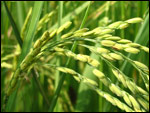 In a press release last June, the anti-GMO watchdog group Center for Food Safety questioned the USDA’s oversight of tests involving genetically altered crops. The agency had just greenlighted a biotech company’s proposal to grow test plots of rice containing human genes on 270 acres in North Carolina and Missouri, right in the middle of large-scale conventional rice production.
In a press release last June, the anti-GMO watchdog group Center for Food Safety questioned the USDA’s oversight of tests involving genetically altered crops. The agency had just greenlighted a biotech company’s proposal to grow test plots of rice containing human genes on 270 acres in North Carolina and Missouri, right in the middle of large-scale conventional rice production.
The press release quotes a CFS scientist thusly:
With this approval, USDA has signaled that it thinks it’s okay to grow drug-producing crops near food crops of the same type, despite the threat of contamination … There have already been numerous examples of contamination of food crops by biotech crops, including pharmaceutical crops. Over time, such contamination of our food is virtually inevitable under the conditions allowed by USDA.
The USDA brushed aside this complaint and plunged forward, asserting that it monitors such tests with all due care.
According to a recently released internal USDA audit, though, the CFS had a point. I couldn’t find the audit on the USDA’s byzantine and near-useless website.
Here is how The New York Times summed it up:
The report, issued late last month by the department’s Office of Inspector General, found that biotechnology regulators did not always notice violations of their own rules, did not inspect planting sites when they should have and did not assure that the genetically engineered crops were destroyed when the field trial was done. In many cases, the report said, regulators did not even know the locations of field trials for which they granted permits.
And here’s a direct quote from the audit, culled from the Times: the USDA “lacks basic information about the field test sites it approves and is responsible for monitoring, including where and how the crops are being grown, and what becomes of them at the end of the field test.”
Guess that’s what you get when you pack oversight agencies at the top with industry flacks.
Interestingly, doing research on another topic, I came across a spirited defense of USDA oversight of biotech field tests. The report declared:
Since 1986, when the first biotech field trials were begun, there have been tens of thousands of regulated field tests for various traits, primarily agronomic. Because seed developers have adhered rigorously to prescribed testing measures for regulated trials, these field trials have not resulted in any known commingling with conventional seeds. [Emphasis added.]
The author was one Dick Crowder, whom I profiled yesterday. Crowder, until December president of the American Seed Trade Association, now serves as the chief agriculture negotiator for the U.S. Trade Office.
 In a
In a 

